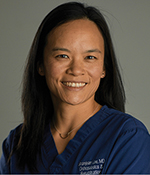
Editor’s note: This article is a companion piece to “Infertility: The Hidden Cost of Orthopaedic Training,” above.
In 2021, I was 2 years out of residency and had started a general orthopaedic practice in Reno, Nevada. My partner, Mikey, and I wanted to start a family but weren’t sure whether we were ready yet. I was 36 years old at the time. We decided to start the process of egg and embryo preservation because we were vaguely aware of age-related fertility decline. At the time, we thought we were being proactive. We did not expect any issues, as I had very normal menstrual cycles and no medical or gynecologic issues.
At the time of my initial consultation, my anti-Müllerian hormone (AMH) levels, a marker of egg reserve and response to in vitro fertilization hyperstimulation protocols, were low at 0.4 ng/mL. For reference, the median AMH level in a 36-year-old is approximately 2.28 ng/mL. This information caught us by surprise but reaffirmed our decision to proceed with embryo preservation, as it seemed like my fertile years were fewer than we had presupposed.
Unfortunately, our first cycle of egg retrieval was unsuccessful. Despite multiple adjustments in the hormone hyperstimulation protocol, there were no follicles or retrievable eggs. The reproductive endocrinologist (REI) offered us two options: We could try another cycle but likely with similar results, or we could consider donor eggs. Because Mikey and I had gone to the REI thinking we were being proactive, this news was completely unexpected and quite devastating. Our hopes to one day have a child suddenly seemed out of reach.
We decided to get a second opinion from an REI in southern California who had more experience and successes in women of “advanced age” and with diminished ovarian reserve. The new physician had a more optimistic point of view and recommended egg-preservation protocols with minimal hormonal stimulation, effectively retrieving the one follicle/egg that my body produced each month. This approach would take more egg retrieval cycles overall but would be a viable option.
Mikey and I agreed with this course of action, and I spent many hours flying back and forth between Reno and southern California for monitoring and egg retrievals between my clinics and OR days. Over the course of 2 years, we underwent 11 egg retrievals, struggled with embryos that did not make it to the blastocyst stage, tried natural conception, and mourned a miscarriage. These experiences stood out as one of the first times in my life when trying harder did not equate to an increased chance of success.
As I navigated the process, I encountered many people who had had similar experiences in the medical field and even in my own residency program. It became very striking to me how little we talk about infertility, especially when it is so common and when we work in a field where childbearing is frequently delayed past prime reproductive years. Just as we learn from our collective surgical complications through morbidity and mortality conferences, talking about age-related infertility can bring awareness to the issue. In turn, this can help our community utilize the tools available to avoid future complications in their personal lives and the associated psychological toll.
Family planning involves many personal choices and looks different for everyone. However, obtaining the relevant information about our own fertility and about fertility-preservation options can help us make informed decisions and avoid missed opportunities. Had I known as a resident what I know now, I certainly would have proceeded with embryo preservation then. I’m sure I would have still balked at the cost, the time commitment, and the bandwidth it takes to think about something other than orthopaedics and plain survival during residency. However, no amount of money can buy back time and eggs that are already gone. My hope is that with more awareness and with an increase in systemic support for fertility-preservation options, the barriers to accessing the appropriate reproductive care will become less of an issue for our residents and other members of our orthopaedic community.
Shanjean Lee, MD, is an orthopaedic surgeon at VA Sierra Nevada Healthcare System in Reno, Nevada. Dr. Lee and her partner, Mikey, feel very fortunate to welcome their “miracle baby,” Corina, this year.